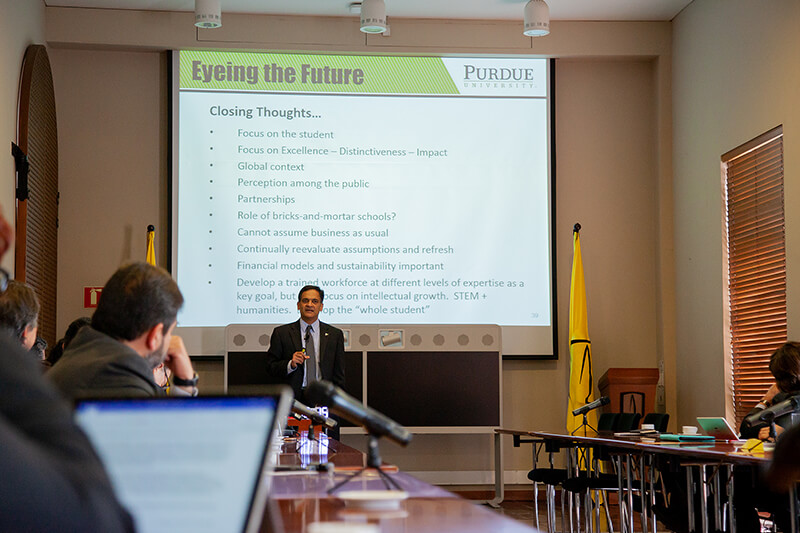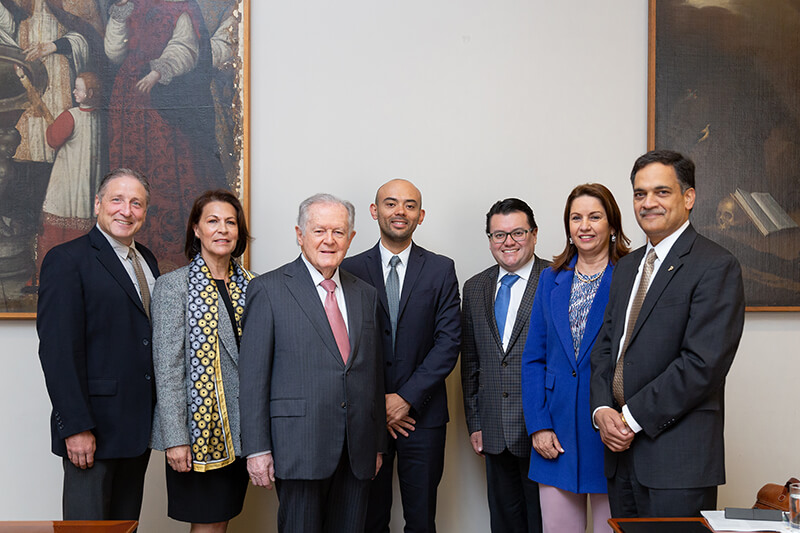July 11, 2018
Purdue delegation meets key Colombian officials to advance sustainable development

Suresh Garimella, executive vice president for research and partnerships, presents a lecture on the university of the future at UniAndes. (Photo provided)
WEST LAFAYETTE, Ind. — As the peace process continues to unfold in Colombia and the country begins transitioning to a new president, Suresh Garimella, executive vice president for research and partnerships at Purdue University, and Kenneth Foster, president’s fellow for Colombia-Purdue Partnerships and a professor of agricultural economics, visited the capital city of Bogotá in June to advance sustainable development in the Orinoquía region.
Pablo Navas, rector of UniAndes (La Universidad de los Andes), hosted the delegation, along with leaders of Colombia’s National Planning Department, the Colombian Agricultural Research Corp., the entrepreneurial organization Asorinoquía, several universities and the private sector to review results of the first phase of a collaboration that began in 2016.
“This trip set the stage for the next critical step in our partnership for a sustainable, equitable and environmentally sound transformation of the Orinoquía region,” said Garimella, who is also the Goodson Distinguished Professor of Mechanical Engineering. “We have been able to make significant progress in this first phase of the project, and we are all eager to begin phase two.”
Purdue University has long had strategic partnerships with the nation of Colombia, including research and education exchanges with top universities and joint projects with U.S. government initiatives such as Farmer to Farmer and Cacao for Peace. The country is also a top destination for Purdue study-abroad opportunities, and more students come to Purdue from Colombia than anywhere else in Latin America. Those existing linkages prompted Colombian officials in 2014 to invite Purdue to assist in developing a science- and systems-driven focus to the government’s master plan for the sustainable development of the Orinoquía region.
 A delegation from Purdue University meets with officials in Colombia to discuss progress on the Orinoquía sustainable development project that began in 2016. From left are Kenneth Foster, president’s fellow for Colombia-Purdue Partnerships; Liliana Gomez Diaz, director, Colombian Partnerships and Engagement Office; Luis Carlos Sarmiento, president, Grupo Aval; Santiago Matallana, deputy director general, National Planning Department of Colombia; Juan Carlos Caiza, counselor to the director general, DNP; Clara Leticia Serrano Castillo, executive director, Asorinoquia; and Suresh Garimella, Purdue executive vice president for research and partnerships. (Photo provided)
Download image
A delegation from Purdue University meets with officials in Colombia to discuss progress on the Orinoquía sustainable development project that began in 2016. From left are Kenneth Foster, president’s fellow for Colombia-Purdue Partnerships; Liliana Gomez Diaz, director, Colombian Partnerships and Engagement Office; Luis Carlos Sarmiento, president, Grupo Aval; Santiago Matallana, deputy director general, National Planning Department of Colombia; Juan Carlos Caiza, counselor to the director general, DNP; Clara Leticia Serrano Castillo, executive director, Asorinoquia; and Suresh Garimella, Purdue executive vice president for research and partnerships. (Photo provided)
Download image
Colombia is among the largest economies in Latin America and is believed to have strong economic growth prospects. The Orinoquía region, located just north of the equator along the Orinoco River watershed, is characterized by tropical savannahs, forested areas along rivers and sparse population. Despite its rich natural resources of farmland, gas reserves, oil and minerals, internal insurgency and unrest over the last few decades have largely undermined progress, and the modest development that has taken hold has generated concerns over environmental degradation and inequality of opportunity among citizens.
Purdue University’s initiative with the Colombian government is designed to pave the way for the regional master plan by examining Orinoquía from a scientific perspective, including economic and social opportunities, physical resources, environmental needs and equity considerations. “Working alongside Colombian partners, Purdue University developed ideas for improving agribusiness and tourism opportunities in the first phase of this work. Strengthening communities, health, education, roads, airports and communication will all need to be factored into future efforts,” Foster said.
The Purdue team completed the first phase of the project in partnership with Colombia’s National Planning Department through a special cooperative agreement with the Colombian School for Public Administration. Jess Lowenberg-Deboer, professor emeritus of agricultural economics, led the team, which included Jonathon Day, associate professor of hospitality and tourism management; Paul Preckel, professor of agricultural economics; John Sanders, professor of agricultural economics; their students; and partners in Colombia with the support of Liliana Gómez Díaz of Purdue’s office in Colombia.
Teams collected data from farmers and agricultural organizations and developed analytical research tools to assist in decision-making for agriculture and tourism development. They also trained representatives of universities, municipalities and departments (states) and identified pilot projects for demonstrating the utility of data-based modeling tools. Initial results and proposed pilot projects to advance economic development in the region were the focus of the meetings in Bogotá last month.
To announce initial results of the partnership, Garimella and Navas co-authored an op-ed for the country’s top newspaper, El Tiempo, in June.
“The article has generated a lot of discussion, including an encouraging response from Rudolph Hommes, the former finance minister of the country. We have added English and Spanish links to the article on our Colombian partnership website, as well as links to our reports and other recent media coverage, to provide a repository of information for Purdue and Colombian team members,” Garimella said.
Another recent op-ed by Garimella, “Expanding the Global Reach of the Twenty-First-Century Research University,” which was published in Science and Diplomacy, resulted in a speaking invitation on the topic from Colombia’s top private university, UniAndes, which is also ranked No. 7 in Latin America by U.S. News and World Report. Reviewing Purdue’s innovations in affordability and accessibility, transformative education, world-changing research, and an entrepreneurship ecosystem, Garimella presented his vision of a major research university of the future, with an eye toward planning for and adapting to the strong forces buffeting higher education – which Garimella said is an issue not only in the United States, but also in Latin America.
Writer: Angela Roberts, akroberts@purdue.edu
Source: Suresh Garimella, sureshg@purdue.eduRelated news releases
Purdue and Colombia build on engagement activities
Colombian Orinoquía region to get sustainable development assistance through Purdue collaboration
Purdue receives ‘Nexo Global’ students, Ph.D. scholarship program
49 undergrads from Colombian university to learn at Purdue for 6 months
Purdue, Colombia advance broad-based partnerships
Purdue, Colombia forge scientific research partnership
Related website
College of Health and Human Sciences

